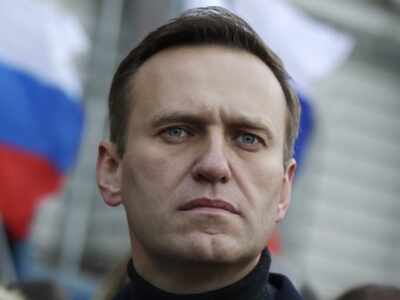
BERLIN: Russian opposition leader Alexei Navalny was poisoned with the same type of Soviet-era nerve agent that British authorities identified in a 2018 attack on a former Russian spy, the German government said on Wednesday, citing new test results. Chancellor Angela Merkel said Navalny was the victim of an “attempted murder by poisoning” and the aim was to silence him.
Merkel’s spokesman, Steffen Seibert, said in a statement that testing by a special German military laboratory at the Charite’s request had now shown “proof without doubt of a chemical nerve agent from the Novichok group.” “It is a dismaying event that Alexei Navalny was the victim of an attack with a chemical nerve agent in Russia. The German government condemns this attack in the strongest terms.”
Navalny, a politician and corruption investigator who is one of Russian President Vladimir Putin’s fiercest critics, fell ill on a flight back to Moscow from Siberia on August
20. He was transferred two days later to Berlin’s Charite hospital, where doctors last week said initial tests indicated Navalny had been poisoned.
British authorities identified Novichok as the poison used in 2018 on former Russian spy Sergei Skripal and his daughter in England. The nerve agent is a cholinesterase inhibitor, part of the class of substances that doctors at the Charite initially identified in Navalny.
Germany demanded a response from the Russian government. The White House called the findings “completely reprehensible” and said that the US will work to hold “those in Russia accountable”. The European Union said in a statement that Russia must investigate thoroughly and transparently the assassination attempt of Navaly. British PM Boris Johnson demanded that Russia explain what happened to Navalny. “It’s outrageous that a chemical weapon was used,” he said on Twitter.
Kremlin spokesman Dmitry Peskov told journalists: “We are ready and have an interest in full cooperation and exchange of data on this topic with Germany.” He also complained that Russia had not received an answer to its request for German doctors to share their findings. “Before the sick man was taken to Berlin, tests were carried out in our country in accordance with all international standards, no poisonous substances were detected,” he said, not using Navalny’s name as is Kremlin practice.
Merkel’s spokesman, Steffen Seibert, said in a statement that testing by a special German military laboratory at the Charite’s request had now shown “proof without doubt of a chemical nerve agent from the Novichok group.” “It is a dismaying event that Alexei Navalny was the victim of an attack with a chemical nerve agent in Russia. The German government condemns this attack in the strongest terms.”
Navalny, a politician and corruption investigator who is one of Russian President Vladimir Putin’s fiercest critics, fell ill on a flight back to Moscow from Siberia on August
20. He was transferred two days later to Berlin’s Charite hospital, where doctors last week said initial tests indicated Navalny had been poisoned.
British authorities identified Novichok as the poison used in 2018 on former Russian spy Sergei Skripal and his daughter in England. The nerve agent is a cholinesterase inhibitor, part of the class of substances that doctors at the Charite initially identified in Navalny.
Germany demanded a response from the Russian government. The White House called the findings “completely reprehensible” and said that the US will work to hold “those in Russia accountable”. The European Union said in a statement that Russia must investigate thoroughly and transparently the assassination attempt of Navaly. British PM Boris Johnson demanded that Russia explain what happened to Navalny. “It’s outrageous that a chemical weapon was used,” he said on Twitter.
Kremlin spokesman Dmitry Peskov told journalists: “We are ready and have an interest in full cooperation and exchange of data on this topic with Germany.” He also complained that Russia had not received an answer to its request for German doctors to share their findings. “Before the sick man was taken to Berlin, tests were carried out in our country in accordance with all international standards, no poisonous substances were detected,” he said, not using Navalny’s name as is Kremlin practice.
Download
The Times of India News App for Latest World News

Coronavirus outbreak
Trending Topics
LATEST VIDEOS
More from TOI
Navbharat Times
Featured Today in Travel
Get the app









